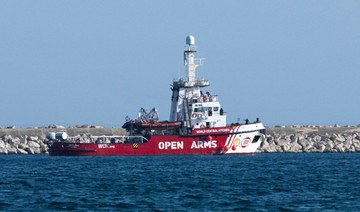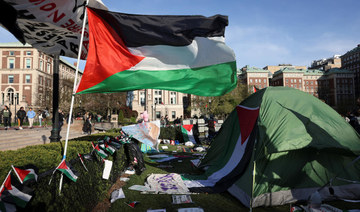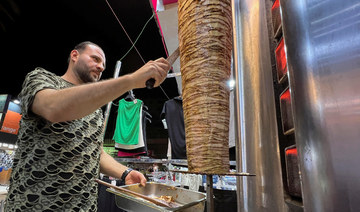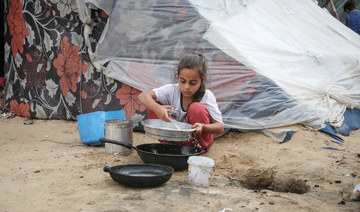MARRAKESH: Egypt and Algeria should further reduce energy subsidies to cut government spending and promote energy efficiency, their energy ministers said on Monday.
Speaking at an Arab energy conference in Marrakesh, Egyptian Petroleum Minister Tarek El-Molla said subsidies were a burden on the budget, using up funds that could be spent on improving social services.
“We will be continuing to remove subsidies,” he said.
Egypt has committed to deep cuts to energy subsidies and other tough fiscal measures as part of a three-year, $12 billion International Monetary Fund (IMF) loan program begun in 2016.
He said subsidised oil encouraged fuel-smuggling, adding that his country had spent $30 billion on oil subsidies in the last five years.
“Oil is sold at a market price representing 75 percent to 80 percent of the cost price,” said the minister.
Echoing him, Algeria’s Energy Minister Mustapha Guitouni said a surge in domestic energy demand should be addressed by gradually reforming the subsidies system.
“Algeria spends $15 billion annually in oil subsidies combined with another $15 billion in subsidising food and health services,” he said.
Algeria, hit by a fall in energy revenues from 2014 to 2017, has increased gasoline prices and talked about reforming a subsidy system but so far kept in place a welfare state as it faces presidential elections in 2019.
Egypt and Algeria want less spending on subsidies
Egypt and Algeria want less spending on subsidies

Migrants eyeing Europe bide their time in Tunisia
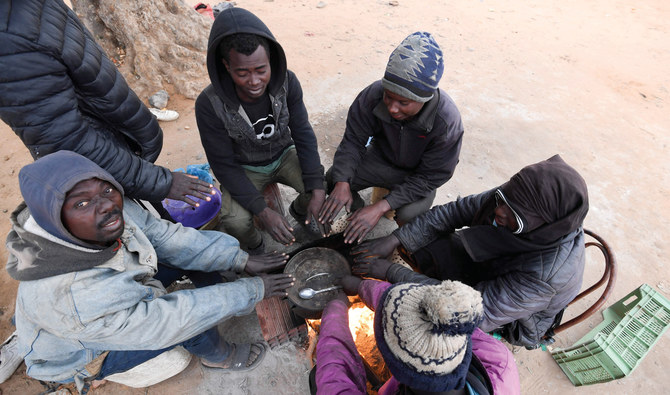
EL-AMRA: Thousands of sub-Saharan migrants have huddled in Tunisian olive groves for months, living in makeshift tents and surviving on meager rations while keeping their hopes alive of reaching Europe.
Around 20,000 are in isolated areas near the towns of El-Amra and Jebeniana, some 30 and 40 kilometers north of the port city of Sfax, humanitarian sources say.
Sfax is one of Tunisia’s main departure points for irregular migration to Europe by boat, and was once a hub for sub-Saharan migrants.
After being forcibly removed from the city last autumn, migrants set up camp in neighboring towns as they awaited their chance to make the perilous crossing.
One weary 17-year-old calling himself Ibrahim said he had left Guinea more than a year ago, hoping to reach the other side of the Mediterranean “to provide for his sick mother and little brother” back home.
He said that after walking for three weeks from the border with Algeria, he arrived in El-Amra in midwinter, about three months ago.
“It’s really difficult here,” he said, adding that he and other migrants feel trapped on the sidelines of society.
“Even shopping, we have to do it in secret ... You can go out looking for work, but when it’s time for your employer to pay you, they would call the police,” he said.
Last year, anti-migrant violence broke out and hundreds of sub-Saharan Africans were kicked out of their jobs and homes.
Tens of thousands embarked from Sfax in 2023 because of its proximity to Italy, the closest European country.
“We are only a few kilometers from Europe,” said Ibrahim of Lampedusa island some 150 kilometers away.
Near El-Amra, in tents made of tarpaulins and rods, groups of five — and at times even 10 — share the same sleeping space.
Men, women and children, mostly from Cameroon, Guinea, Nigeria, Senegal, Sierra Leone and Sudan, congregate by language.
The women cook stew as men remove the feathers of inedible-looking yet indispensable bony chickens.
The winter “was very cold, but we managed to survive thanks to the solidarity we have as African brothers,” said Ibrahim.
“If someone has food and you don’t, they give you some,” he said.
“We bought the tarpaulins with our money,” which relatives managed to send them, “or by begging.”
Some 7,000 migrants received their first food aid in months from NGOs earlier in April, but they said this was not enough and called for more help from Europe, which has ramped up measures aiming to curb irregular migration.
According to Romdhane Ben Amor, spokesman of the Tunisian NGO FTDES, the North African country “is turning into a de facto detention center because of border control agreements signed with the EU.”
Hygiene is a pressing concern at the encampments. “There have been many births and sicknesses,” said Ibrahim.
One humanitarian source said there had been one migrant birth per day in recent weeks at a hospital in Jebeniana.
Salima, 17, said she had no diapers for her four-month-old baby and had to use plastic bags instead.
While awaiting the resumption of departures for Europe, delayed because of bad weather, Salima said she was still determined to make the crossing.
Tunisian authorities raided several encampments recently, tearing down tents and kicking out some migrants, after locals allegedly reported thefts.
Near Jebeniana, journalists saw used tear gas canisters, bulldozers and destroyed tents — some of which were already being put back up.
“We’re very tired of the police,” said 22-year-old Sokoto — also a pseudonym — who left Guinea three years ago and entered from Algeria last January.
“Just yesterday, I was chased from shops” in the town of El-Amra, he said.
Mohamed Bekri, a resident of El-Amra, said he often brings food and water to the migrants for “humanitarian” reasons.
“There are babies who are three and six months old,” he said.
Despite the tensions and the dire situation the migrants find themselves in, none of those interviewed said they wanted to return to their countries of origin.
“The reverse gear is broken,” said Sokoto. “I left to help my family and I suffered a lot to get here.”
World Central Kitchen to resume Gaza aid after staff deaths in Israeli strike
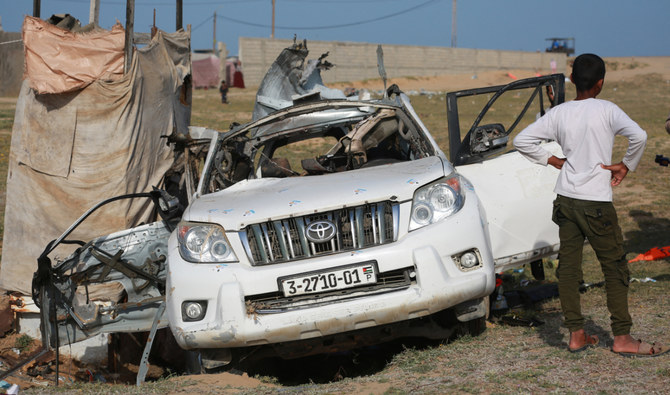
NICOSIA: World Central Kitchen or WCK said it would resume operations in the Gaza Strip on Monday, a month after seven workers of the US-based charity were killed in an Israeli air strike. Prior to halting operations, WCK had distributed more than 43 million meals in Gaza since October, representing by its own accounts 62 percent of all international NGO aid.
The charity said it had 276 trucks with the equivalent of almost 8 million meals ready to enter through the Rafah Crossing and will also send trucks into Gaza from Jordan.
“The humanitarian situation in Gaza remains dire,” said the charity’s chief executive officer Erin Gore.
“We are restarting our operation with the same energy, dignity, and focus on feeding as many people as possible.”
The April 1 deaths triggered widespread condemnation and demands from Israel’s allies, including the US, for an explanation.
Israel said its inquiries had found serious errors and breaches of procedure by its military, dismissing two senior officers and reprimanding senior commanders.
WCK is demanding an independent investigation. Israel’s six-month war against Hamas in Gaza followed an Oct. 7 attack by the militant group in southern Israel when more than 250 hostages were seized and some 1,200 people killed, according to Israeli tallies. Israel’s offensive has killed more than 34,000 people, Palestinian health authorities say, and caused a humanitarian disaster for the enclave’s more than 2 million inhabitants.
“We have been forced to make a decision: Stop feeding altogether during one of the worst hunger crises ever ... Or keep feeding knowing that aid, aid workers and civilians are being intimidated and killed,” Gore said.
“These are the hardest conversations, and we have considered all perspectives when deliberating. Ultimately, we decided we must keep feeding, continuing our mission of showing up to provide food to people during the toughest of times.” (Writing by Michele Kambas; Editing by Andrew Cawthorne)
White House urges ‘peaceful’ campus protests after hundreds arrested
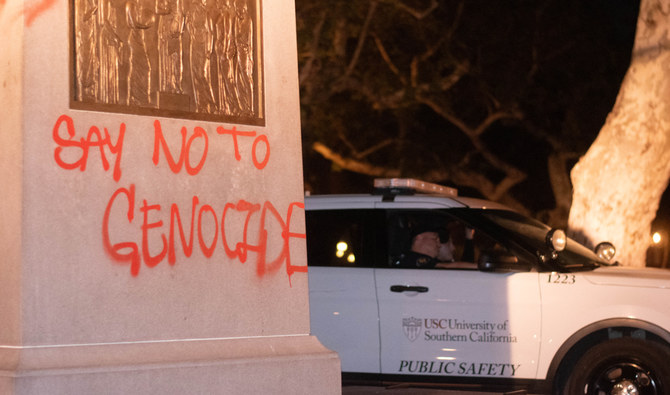
WASHINGTON: The White House insisted on Sunday that pro-Palestinian protests that have rocked US universities in recent weeks must remain peaceful, after police arrested around 275 people on four separate campuses over the weekend.
“We certainly respect the right of peaceful protests,” National Security Council spokesman John Kirby told ABC’s “This Week.”
But, he added: “We condemn the anti-Semitism language that we’ve heard of late and certainly condemn all the hate speech and the threats of violence out there.”
The demonstrations began at Columbia University in New York, but they have since spread rapidly across the country.
While peace has prevailed on many campuses, the number of protesters detained — at times by police in riot gear using chemical irritants and tasers — is rising fast.
They include 100 at Northeastern University in Boston, 80 at Washington University in St. Louis, 72 at Arizona State University, and 23 at Indiana University.
Among those arrested at Washington University was Green Party presidential candidate Jill Stein, who faulted police for aggressive tactics she said provoked the sort of trouble they are meant to quell.
“This is about freedom of speech ... on a very critical issue,” she told CNN shortly before her arrest on Saturday.
“And there they are, sending in the police and creating a riot.”
College administrators have struggled to find the best response, caught between the need to respect free-speech rights and the imperative of containing inflammatory and sometimes violently anti-Semitic calls by protesters.
At the University o Southern California, school officials late on Saturday closed the main campus to the public after pro-Palestinian groups again set up an encampment that had been cleared earlier, the school announced on X.
With final exams coming in the next few weeks, some campuses — including the Humboldt campus of California State Polytechnic University, have closed and instructed students to complete their classes online.
The activists behind the campus protests — not all of them students — are calling for a ceasefire in Israel’s war with Hamas and want colleges to sever ties with Israel.
Brunson scores career playoff-high 47 points, leads Knicks over 76ers for 3-1 lead

PHILADELPHIA: Jalen Brunson scored a career playoff-high 47 points, added 10 assists and the New York Knicks beat the Philadelphia 76ers 97-92 on Sunday to take a 3-1 lead in their first-round playoff series.
OG Anunoby added 16 points and 14 rebounds, and took on some of the defensive assignment against Joel Embiid in the fourth quarter as the Knicks moved within a victory of getting to the Eastern Conference semifinals for the second straight year.
The No. 2-seeded Knicks can do that with a victory at home on Tuesday night.
Embiid played the entire second half after the 76ers faltered badly when he sat in the first. But the All-Star center, who has been dealing with lingering problems from his surgically repaired left knee that he appeared to reinjure after a dunk in Game 1, and was recently diagnosed with Bell’s palsy, a form of facial paralysis, couldn’t muster a basket in the fourth quarter.
Embiid finished with 27 points, 10 rebounds and six assists. Tyrese Maxey added 23 points for the 76ers, who will try to force another game at home, which would be Thursday.
Not that the 76ers had much of a home-court advantage Sunday. Knicks fans were all over the arena and gave Brunson louder chants of “MVP! MVP!” than Embiid — who won the award last season — received from the home fans.
Brunson earned every one of them on a day some of his usual support couldn’t get going.
Josh Hart missed all seven shots and Donte DiVincenzo missed his first seven. But Hart grabbed 17 rebounds and the Knicks kept going after missed shots, especially when it was clear Embiid didn’t have the energy to keep chasing them, and scored 21 second-chance points.
Brunson was in the locker room to start the fourth quarter but returned to hit a basket over Embiid during a 6-0 Knicks run that gave them the lead for good and made it 86-81. He had another basket that made it 95-89 with 55 seconds remaining and the Knicks closed it out.
Puppet maker turns tins into toys in ruins of war
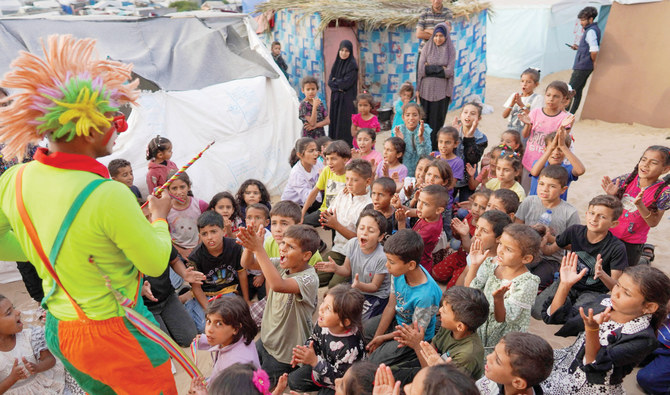
DEIR AL-BALAH: On a cinder block work table in the war-torn Gaza Strip, puppet maker Mahdi Karira is busy turning old tin cans into figurines.
He hums as he works, knowing his makeshift marionettes will put a smile on the faces of children displaced by the more than six-month war in the coastal Palestinian territory.
“These puppets can make things around us beautiful,” he said, surveying his handiwork.
Before the war, Karira had a large collection of brightly colored puppets, often taking them to perform in theaters.
Now, he performs in camps for displaced people after Israeli bombardment forced him to flee his home in Gaza City to Deir Al-Balah, in the center of the narrow strip.
Several puppets are suspended along the workshop walls.
Their bodies are topped by expressive human faces carved onto wood or tin cans, and their limbs are hooked to strings that Karira uses to make them walk and talk.
With Gaza under siege, new materials are hard to come by, so he makes do with debris, fishing lines, and old sardine tins stamped with the UN logo, which he brings to life with a touch of paint.
“Unfortunately, after the displacement, there were no more puppets, no more theater,” he said.
“I left all my work in Gaza City,” in the territory’s north.
“There are not many raw materials to work with — only cans of all shapes and sizes around us.”
UNICEF, the UN children’s agency, estimates the war in Gaza has displaced around 850,000 children in Gaza.
Many are sheltering in camps around Deir Al-Balah, where childhood fun is a distant memory.
“I try to make shows and performances to bring joy to the children in the displacement camps, so we remain steadfast on this earth despite the aggressions,” Karira said about Israel’s air and ground campaign in Gaza, sitting beside his pliers and a painted puppet head.
Karina said keeping up his craft as the war rumbled around him was vital.
“The most important thing is to remain faithful to your work by creating your art,” he said.
“Each of us has his trade, talents, and art that allows him to continue to have an activity despite the aggression.”
The territory’s cultural heritage has been devastated — from art centers and museums to historic buildings.
As he watches Gaza reduced to rubble, Karira said the puppets “can tell beautiful things, tell our history and stories to children.”




